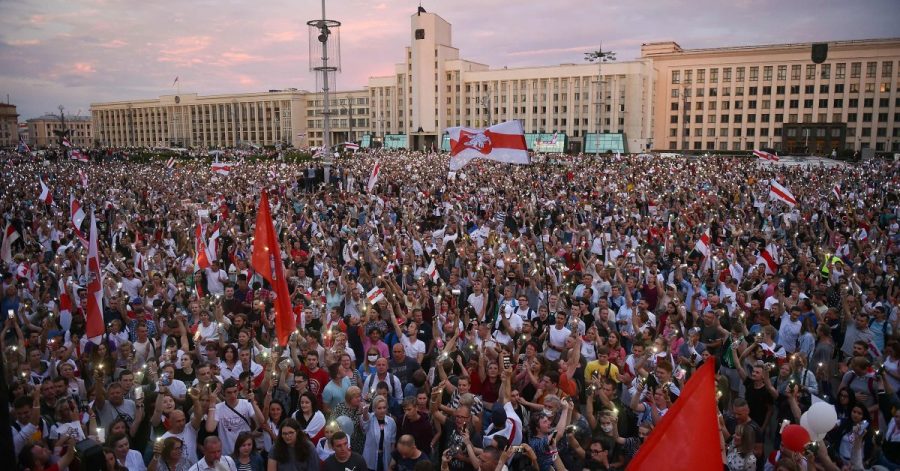President Lukashenko’s Regime in Belarus Under Fire, Pro-Democracy Protestors Persecuted
September 30, 2020
MINSK, BELARUS – On August 10th, 2020, Belarusian President Alexander Lukashenko, who has previously been accused of violating human rights and holding unfair elections, claimed victory at the polls.
Since the election, protests against the Belarusian government have broken out, and the public claim that the election results are fraudulent. The people have called for a new, fair, election but were met with violence from the Belarusian government.
Police and military forces have responded to peaceful protestors with tear gas, water cannons, rubber bullets, stun grenades, and, according to multiple accounts, live bullets. Multiple Belarusians have been confirmed dead as a result of their involvement in the protests and their time in police custody.
Lushakenko’s regime has gone to great measures to minimize global attention and criticism from other foreign leaders by limiting media outlets and newspapers’ access to protestors. Prior to the election, Lukashenko jailed his political opponent Viktar Babaryka. He has also jailed activist Siarhei Tsikhanouski. Prominent challenger, Svetlana Tikhanovskaya, was forced to flee the country as a result of pressure from the Lukashenko regime. Journalists and civilians who refused to submit to Lukashenko’s have also been jailed. The U.N. has reported cases of torture and mistreatment of those arrested by Belarusian officials.
Representatives from the Organization for Security and Cooperation in Europe (OSCE), which aims to promote equality, peace and democracy in European nations, were not present to observe the Belarus election and, along with the European Union, have raised concerns about the accuracy of the results.
Belarus has been economically and politically entangled with Russia for many years. President Lukashenko has ruled Belarus since the USSR’s demise in a manner some equate to the leadership seen in Russia during the cold war. Similar to President Vladimir Putin of Russia, Lukashenko has led his nation into distress by downplaying the threat of COVID-19 and encouraging his people to engage in non-socially distanced activities. Lukashenko’s policy decisions at the start of the pandemic have worsened Belarus’ economic standing further. The nation experienced a recession in 2015 and 2016 and the GDP growth has since been declining. The Belarusian people have consequently shown reduced support for government leadership. Lukashenko’s repressive policies have gained support from President Putin, who has agreed to provide Belarusian authorities with $1.5 billion in financial aid to quell the protests. Following Russia’s interference in the Crimean peninsula’s 2014 pro-democracy protests, many are concerned that Russia will continue meddling in eastern European politics and actively work to minimize the impact of the protests in Belarus. Lukashenko’s threats of increased repression have only fanned the flames of the Belarusian people in their desire for democracy.
Protests have been held in over 30 cities, with a protest in Minsk drawing over 200,000 people. Many such protests have been led by women, who have been historically underestimated by Lukashenko himself. In prior years, Lukashenko has been vocal about his attitude toward women, and has publicly stated that “Our society has not matured enough to vote for a woman. This is because by constitution the President handles a lot of power.” Lukashenko is not averse to using sexist language and, when speaking about Svetlana Tikhanovskaya, his main opposition leader, said she should spend more time cooking for her children.
While Lukashenko remains in power, protests have continued and several countries have imposed travel restrictions on Lukashenko and 29 of his officials. The EU has prepared a list of Belarusian officials who they plan to impose sanctions upon. Three countries have already imposed sanctions against these officials.
Belarusian protesters say there is no going back to Lukashenko’s regime. The people will no longer tolerate living under a repressive and violent government.
Disclaimer: Article pulls upon coverage from the BBC and the Washington Post



